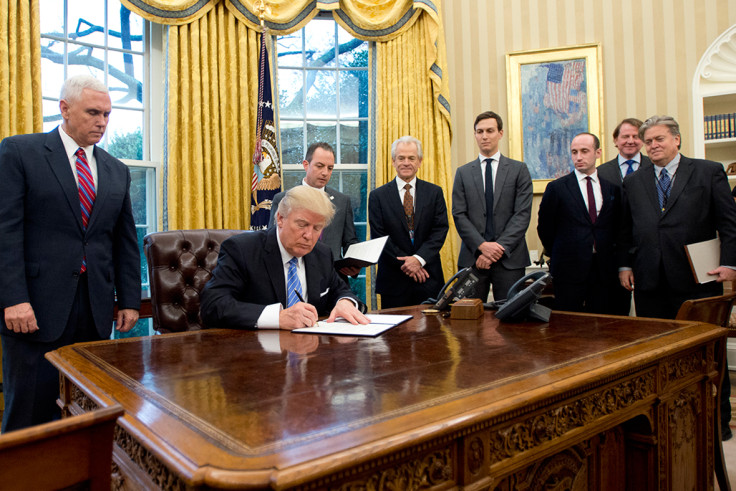Trump and his white, male billionaires don't like women having all this freedom – so they're taking it back
The 'global gag rule' against abortion was signed a day after the anniversary of Roe vs Wade.

As millions of people marched to raise concerns about the incoming administration of President Donald Trump on Saturday (21 January), some seemed confused about the purpose of the protest. The marches were unnecessary, many on Twitter argued, because Trump poses no threat to rights or freedoms.
The new president has lost little time in providing the perfect example of exactly the kind of threat and disempowerment he represents for those who do not match the make-up of his overwhelmingly white, rich, male cabinet. Today a photograph emerged of Trump, surrounded by a group of other white men, signing one of his first executive orders, to reinstate the "global gag rule". This order bans American money from going to any international health organisation that provides information about abortion as a family planning option, regardless of its other activities and services.
Currently, US money helps 27 million women access contraceptives globally, but the potential slashing of these efforts as a result of Trump's action could have devastating consequences. A 2010 study found that the global gag rule negatively impacted efforts to mitigate high rates of unsafe abortion, a major problem considering that 21 million unsafe abortions occur globally every year, accounting for a huge 13% of all maternal deaths. Other studies have linked the global gag rule to increased abortion rates and reduced access to contraception, and shown that it has hampered HIV prevention efforts and led to the closure of health clinics and increases in unplanned pregnancies in various different countries.
Further highlighting the threat Trump poses to reproductive freedoms and rights, the order was signed a day after the anniversary of Roe vs Wade, the landmark Supreme Court decision that gave women access to abortion. During the election campaign, Trump said that the overturning of Roe vs Wade would "happen automatically" if he became president, as he would have the opportunity to appoint one or more new pro-life justices to the Supreme Court. He has also vowed to defund Planned Parenthood, an organisation which provides more than 2.5 million people with healthcare every year, including HIV tests, contraceptive services and breast exams. Just 3% of the services it provides are related to abortion.
Flanking Trump were a group of men he has assembled in his own image. Not only is his cabinet overwhelmingly white and male, but he has also assembled the richest administration in modern American history. Concerns that George W Bush's 2001 cabinet, with its net worth of about $250m (£200m), might be out of touch with the needs of ordinary Americans, pale ludicrously in comparison with Trump's glut of billionaires.
These are also men who think along the same lines as their leader. Those appearing in the photograph as Trump deals a sweeping blow to women's reproductive healthcare around the world include Vice President Mike Pence, who gutted Planned Parenthood funding as Governor of Indiana, leading to an outbreak of HIV, and who has described same-sex couples as a sign of "societal collapse". Then there's Stephen Bannon, who presided over Breitbart News as it ran articles with headlines such as "Birth control makes women unattractive and crazy" and "Here's why there ought to be a cap on women studying science".
Read more: Why are men still rating women out of 10?
Representation matters. Here is a group of decision makers who have likely never had to face overwhelming pressure to feed their families on a single low-wage salary, never had to weigh up the enormous implications of a decision about whether to grow another human being inside their body, never been forced to confront daily abuse and discrimination because of the colour of their skin. When the group of people in charge doesn't reflect the diversity of the public its choices will impact, there are real concerns about whose needs and interests are likely to be best represented in policy making decisions. Trump's choice of early executive orders, and the company in which he signed them, does very little to allay those fears.
What the image of Trump signing the order perfectly encapsulates, and what millions of people feel rightly concerned about, is the fact that Trump and his cabinet of white, male billionaires will now have immense legislative power over issues they are unlikely ever to be personally affected by, and of which they seem to have little understanding. Here is a group of people with deeply homogenous opinions, backgrounds and life experiences, who have made sweeping or denigrating statements about women, immigrants, Muslims, people of colour, disabled people and other minority groups. Now they take control of decisions that will impact millions of peoples' lives. Is it really so difficult to understand why people are scared?
Laura Bates is the founder of the Everyday Sexism Project
© Copyright IBTimes 2025. All rights reserved.




















